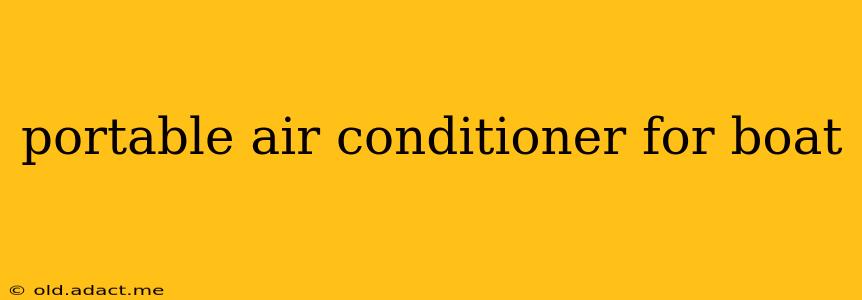Choosing the right portable air conditioner for your boat can significantly enhance your onboard comfort, especially during those hot summer months. However, the marine environment presents unique challenges compared to land-based installations. This guide will walk you through the key considerations when selecting a portable AC unit for your vessel, ensuring you make an informed decision.
What are the different types of portable air conditioners for boats?
There are primarily two types of portable air conditioners suitable for boats: 12-volt DC units and units that run on standard 110-volt AC power. 12-volt DC units are often preferred for smaller boats because they directly connect to the boat's electrical system. 110-volt AC units require a generator or shore power connection, making them more suitable for larger boats or those with ample power sources. The choice depends on your boat's electrical system and power needs.
How much power does a boat air conditioner need?
The power requirements of a boat air conditioner vary considerably depending on the size of the space you need to cool and the unit's BTU rating (British Thermal Units). BTUs measure cooling capacity; higher BTUs mean more powerful cooling. It's crucial to accurately assess your boat's size and insulation to determine the appropriate BTU rating. Overestimating is better than underestimating, as a unit that's too small will struggle to cool the space effectively. You'll also need to ensure your boat's electrical system can handle the amperage draw of the chosen unit.
What are the best portable AC units for boats?
There's no single "best" portable AC unit for all boats. The optimal choice depends on your specific needs, including your boat's size, power system, and budget. Researching reviews from reputable sources and considering factors like BTU rating, energy efficiency (measured in EER or SEER), noise level, and features will help you find the best fit. Look for units designed for marine environments, which often include features to handle humidity and potential saltwater exposure.
How do I install a portable air conditioner in my boat?
Installing a portable air conditioner on a boat is usually simpler than in a house, but it still requires careful planning. For 12-volt DC units, you’ll need to connect the unit to your boat's electrical system, ensuring proper wiring and fusing to prevent overloads. 110-volt AC units require connecting to a generator or shore power outlet, typically via a suitable adapter and cord. Proper ventilation is critical for both types; ensure there's sufficient airflow for both the intake and exhaust of the unit to prevent overheating and ensure optimal performance. Always consult with a qualified marine electrician if you are unsure about any aspect of the installation.
How to maintain a portable air conditioner for boats?
Regular maintenance is crucial for extending the lifespan and efficiency of your boat's portable air conditioner. This includes cleaning the filters regularly to prevent dust and debris buildup, checking the condenser coils for dirt and grime, and inspecting the drainage system to prevent blockages. Following the manufacturer’s instructions for maintenance is essential. Furthermore, storing the unit properly during periods of non-use will prevent damage and corrosion.
What is the average cost of a portable boat air conditioner?
The cost of a portable boat air conditioner varies considerably based on the BTU rating, features, and whether it runs on 12-volt DC or 110-volt AC power. Expect to pay anywhere from a few hundred dollars for smaller, less powerful units to several thousand for larger, higher-capacity units with advanced features.
How do I choose the right BTU for my boat?
Determining the correct BTU rating requires carefully calculating the volume of the space you intend to cool. Many online BTU calculators can assist with this process, but factors like insulation, the number of windows, and the outside temperature will also impact the required BTU output. It's generally better to choose a unit with a slightly higher BTU rating than you initially estimate to ensure effective cooling.
By carefully considering the factors outlined above, you can select the perfect portable air conditioner to make your boating experience more comfortable, regardless of the outside temperature. Remember to prioritize safety and always consult a qualified professional for installation and maintenance if needed.
